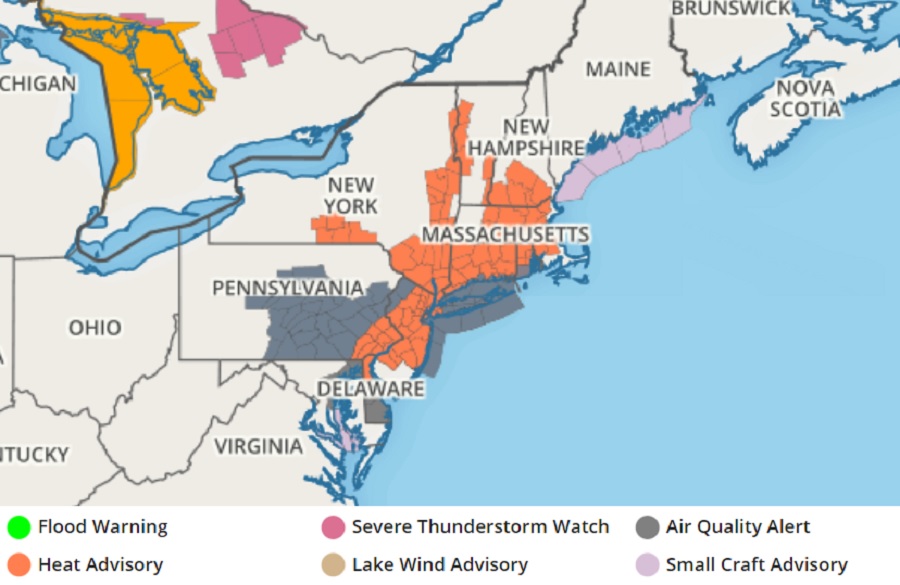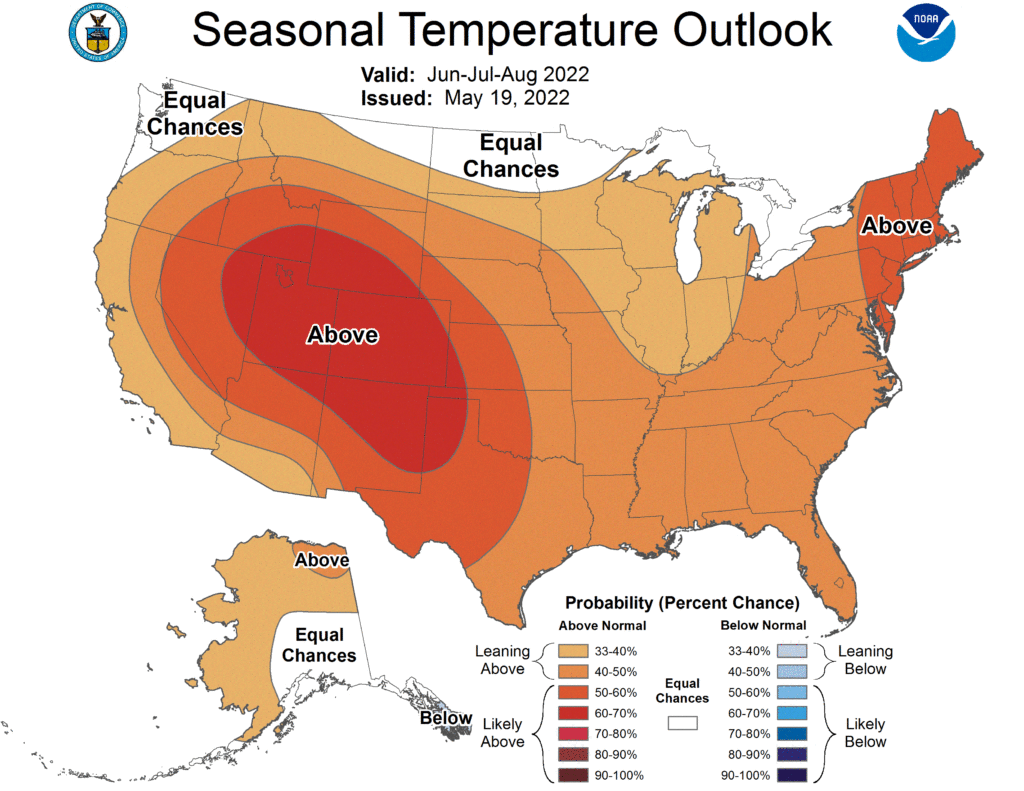
While the northeast is getting ready to chill-out from a very early blast of summertime heat as temperatures soar into the 90’s and 100’s, the NOAA Climate Prediction Center’s latest seasonal outlook suggests this may be a preview of what could be a very hot summer.
For now, the National Weather Service is busy issing heat-related weather warnings, encouraging people to stay safe from unusually hot temperatures in the forecast today and tomorrow from Delaware to Vermont, including the cities of Philadelphia and New York.

Heat Advisories are up across portions of Delaware, New Jersey, Pennsylvania, New York, Connecticut, Rhode Island, Massachusetts, New Hampshire, and Vermont. Different types of heat-related products issued by the National Weather Service mean different things:
- Excessive Heat Warning—Take Action! An Excessive Heat Warning is issued within 12 hours of the onset of extremely dangerous heat conditions. The general rule of thumb for this Warning is when the maximum heat index temperature is expected to be 105° or higher for at least 2 days and night time air temperatures will not drop below 75°; however, these criteria vary across the country, especially for areas not used to extreme heat conditions. If you don’t take precautions immediately when conditions are extreme, you may become seriously ill or even die.
- Excessive Heat Watches—Be Prepared! Heat watches are issued when conditions are favorable for an excessive heat event in the next 24 to 72 hours. A Watch is used when the risk of a heat wave has increased but its occurrence and timing is still uncertain.
- Heat Advisory—Take Action! A Heat Advisory is issued within 12 hours of the onset of extremely dangerous heat conditions. The general rule of thumb for this Advisory is when the maximum heat index temperature is expected to be 100° or higher for at least 2 days, and night time air temperatures will not drop below 75°; however, these criteria vary across the country, especially for areas that are not used to dangerous heat conditions. Take precautions to avoid heat illness. If you don’t take precautions, you may become seriously ill or even die.
- Excessive Heat Outlooks—Be Aware! The outlooks are issued when the potential exists for an excessive heat event in the next 3-7 days. An Outlook provides information to those who need considerable lead-time to prepare for the event.

Unfortunately, it looks like this weekend’s weather could be a sneak preview of what can be expected this summer. In the latest Climate Prediction Center’s Seasonal Temperature Outlook, there are above normal chances of warmer temperatures across both the Northeast and Western U.S.. In fact, with the exception of southeastern Alaska, the far northern Plains, and the Pacific Northwest, much of the country should see above normal temperatures if the outlook comes to fruition. This latest outlook covers the period from June through July and August.
Whether it is for this weekend’s extreme heat or for the forecast heat over the summer, the National Weather Service has these basic tips to show how anyone can deal with the heat safely:
- Outdoor Activities
- Slow down. Reduce, eliminate or reschedule strenuous activities until the coolest time of the day. Those particularly vulnerable to heat such as children, infants, older adults (especially those who have preexisting diseases, take certain medications, living alone or with limited mobility), those with chronic medical conditions, and pregnant women should stay in the coolest available place, not necessarily indoors.
- Dress for summer. Wear lightweight, loose fitting, light-colored clothing to reflect heat and sunlight.
- Minimize direct exposure to the sun. Sunburn reduces your body’s ability to dissipate heat.
- Eating and Drinking
- Eat light, cool, easy-to-digest foods such as fruit or salads. If you pack food, put it in a cooler or carry an ice pack. Don’t leave it sitting in the sun. Meats and dairy products can spoil quickly in hot weather.
- Drink plenty of water (not very cold), non-alcoholic and decaffeinated fluids, even if you don’t feel thirsty. If you are on a fluid-restrictive diet or have a problem with fluid retention, consult a physician before increasing consumption of fluids.
- Do not take salt tablets unless specified by a physician.
- Cooling Down
- Use air conditioners or spend time in air-conditioned locations such as malls and libraries.
- Use portable electric fans to exhaust hot air from rooms or draw in cooler air.
- Do not direct the flow of portable electric fans toward yourself when room temperature is hotter than 90°F. The dry blowing air will dehydrate you faster, endangering your health.
- Take a cool bath or shower.
- Check on Others
- Check on older, sick, or frail people who may need help responding to the heat. Each year, dozens of children and untold numbers of pets left in parked vehicles die from hyperthermia. Keep your children, disabled adults, and pets safe during tumultuous heat waves.
- Don’t leave valuable electronic equipment, such as cell phones and gps units, sitting in hot cars.
- Make sure rooms are well vented if you are using volatile chemicals.